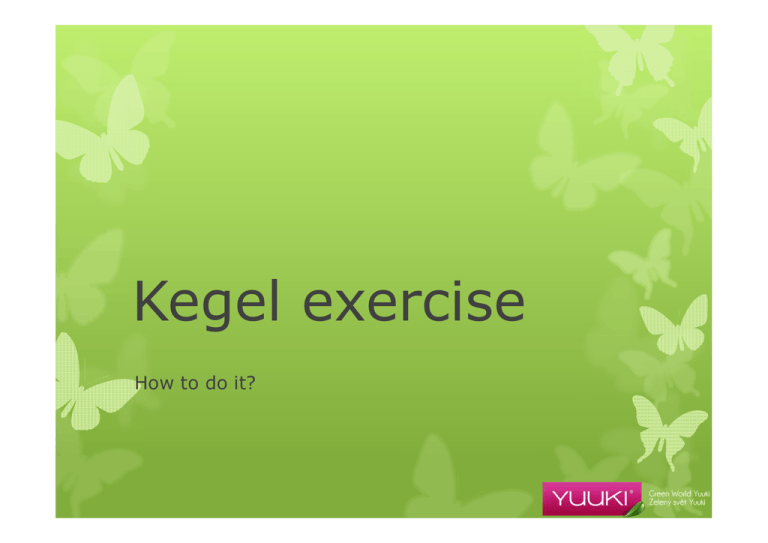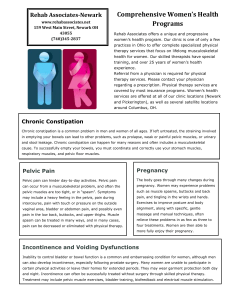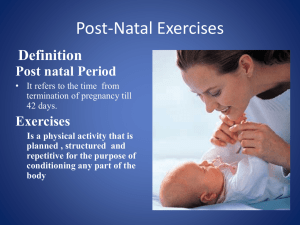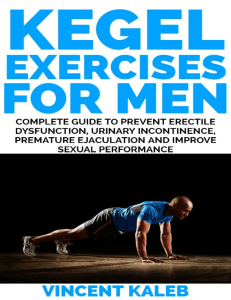
Kegel exercise
How to do it?
The pelvic floor in our body has unique meaning which just few of us are realizing.
Women often do not pay as much attention to this area as it deserves.
WHY SHOULD I DEAL WITH GETTING BETTER MY PELVIC
FLOOR MUSCLES?
•
Can help with the problem of incontinence (uncontrolled leakage of urine), and
serves to prevent this inconvenience
• Helps to improve sexual experiences, it helps with the inability to reach orgasm
• Strengthening muscles helps control of posture and relative tummy
• Menstrual cup keeps better in the right position thanks to the pelvic floor muscles if it leaks, the problem is often in the weak muscles
See more information in the attachment…
Kegel exercise
Pelvic floor exercise, also known as Kegel exercise, consists of
repeatedly contracting and relaxing the muscles that form part of the
pelvic floor, now sometimes colloquially referred to as the "Kegel
muscles". Several tools exist to help with these exercises, although
various studies debate the relative effectiveness of different tools versus
traditional exercises. Exercises are usually done to reduce urinary
incontinence, reduce urinary incontinence after childbirth and reduce
premature ejaculatory occurrences in men, as well as to increase the size
and intensity of erections. Kegel exercise should be part of every
woman´s life. They were first described in 1948 by Arnold Kegel.
Health effects for women
Factors such as pregnancy, childbirth, aging, being overweight, and
abdominal surgery such as cesarean section, often result in the weakening
of the pelvic muscles. This can be assessed by either digital examination
of vaginal pressure or using a Kegel perineometer. Kegel exercises are
useful in regaining pelvic floor muscle strength in such cases.
Sexual function
In 1952, Dr. Kegel published a report in which he claimed that the women
doing this exercise were attaining orgasm more easily, more frequently
and more intensely: "it has been found that dysfunction of the
pubococcygeus exists in many women complaining of lack of vaginal
feeling during coitus and that in these cases sexual appreciation can be
increased by restoring function of the pubococcygeus." There is
controversy over the precise effects of the PC muscle on orgasmic
response.
https://en.wikipedia.org/wiki/Kegel_exercise
https://en.wikipedia.org/wiki/File:Kegel_exercises_
diagram.png
Kegel exercise
How to do Kegel exercises
It takes diligence to identify your pelvic floor muscles and learn how to contract and
relax them. Here are some pointers:
Find the right muscles. To identify your pelvic floor muscles, stop urination in
midstream. If you succeed, you've got the right muscles.
Perfect your technique. Once you've identified your pelvic floor muscles, empty
your bladder and lie on your back. Tighten your pelvic floor muscles, hold the
contraction for five seconds, and then relax for five seconds. Try it four or five times in
a row. Work up to keeping the muscles contracted for 10 seconds at a time, relaxing
for 10 seconds between contractions.
Maintain your focus. For best results, focus on tightening only your pelvic floor
muscles. Be careful not to flex the muscles in your abdomen, thighs or buttocks. Avoid
holding your breath. Instead, breathe freely during the exercises.
Repeat 3 times a day. Aim for at least three sets of 10 repetitions a day.
http://www.mayoclinic.org/healthy-lifestyle/womens-health/in-depth/kegel-exercises/art20045283
Kegel exercise
1. Standing
Bend one leg. Drag it
below the knee, bring
the thigh to your
chest. Now wait for a
few seconds. Go back
to basic stance.
Repeat it with the
other leg.
2. Standing - crossed legs
Keep your legs crossed. Lean
forward and try to touch the
ground with your hands. Lean
forward slowly vertebra after the
vertebra. And slowly return to
starting position.
3. Kneeling
From a basic position
while sitting on your
heels slightly lift the
buttocks.
4. Kneel
Kneel. Put your hands
on the mat. Arms and
legs form a right angle.
The head is in the
extension of the your
body. Switch one limb,
let her outstretched
and slightly oscillate.
5. In the sitting
Place your arms on your elbows.
Legs bent at the knees.
Alternately touching toe and heel
pads.
6. Cycling
Sitting. Lean on our elbows.
Simulate cycling.
7. Lie on your back
Lie on your back. Legs bent at the
knees and spread your legs apart of
the length of your feet. Hold your
hands above your head. Slowly rise
shoulder blade from the floor to the
lower angle. Regularly breathe.
8. Abs
Lie on your back. Legs bent at the
knees. Your hands are stretched. Try to
sit slowly without swing until you put
your hands on the knees. During the sit
you exhale. When you go down back to
floor you inhale.
9. Lie on your back
Lie on your back. Legs slightly bent at
the knees. Without swing lift the pelvis
and try to lift the buttocks off the
ground. Pay attention to contract the
pelvic muscles.
http://www.rehabilitace.info/lidske-telo/kegelovy-cviky-posilovani-svalu-panevniho-dna/




